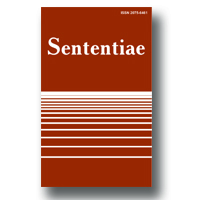|
1.
|
Sententiae:
Volume >
29 >
Issue: 2
Всеволод Кузнецов
Vsevolod Kuznetsov
Александр Блок: Вечная Женственность После Похорон Прекрасной Дамы
A. Blok: the Eternal Feminineness after the Funeral of Fair Lady
abstract |
view |
rights & permissions
| cited by
The article is dedicated to the ideas of Eros and Femininity of poet Alexander Blok. The central place in the work is given to the problem of ontological status of Blok’s Fair Lady. The authors show that the poet has been looking for ontological place of Femininity in nature, society and universe on the whole for a long period of time. As a result, Blok finds the true kingdom of Fair Lady in time and in history.
The article is dedicated to the ideas of Eros and Femininity of poet Alexander Blok. The central place in the work is given to the problem of ontological status of Blok’s Fair Lady. The authors show that the poet has been looking for ontological place of Femininity in nature, society and universe on the whole for a long period of time. As a result, Blok finds the true kingdom of Fair Lady in time and in history.
|
|
|
2.
|
Sententiae:
Volume >
29 >
Issue: 2
Ігор Немчинов
Ihor Nemchynov
Антиномії Свободи, Або Три Спокуси Достоєвського
The Antinomies of the Freedom, or the Three Temptations of Dostoevsky
abstract |
view |
rights & permissions
| cited by
In this article the main theme of Dostoevsky – the freedom is analyzed. Researchers, who study the legacy of Dostoevsky, try to consider one or another aspect of his work as a more or less constant, complete system. Following the Russian tradition, they seek to record a "positive" Dostoevsky. The author believes that there is no such Dostoevsky. Dostoevsky put "cursed questions" not to get a final answer to them but merely for the process of questioning what actually means "living" them through. The author believes that the antinomy of freedom for Dostoevsky leaves open the problem of choosing between the Boholyudyna and Lyudyno-boh. The content of his works is studying their opposition within the human soul, which lasts throughout life. The process of choice, the arguments in favor of one or the other are more important for Dostoevsky than the final answer.
In this article the main theme of Dostoevsky – the freedom is analyzed. Researchers, who study the legacy of Dostoevsky, try to consider one or another aspect of his work as a more or less constant, complete system. Following the Russian tradition, they seek to record a "positive" Dostoevsky. The author believes that there is no such Dostoevsky. Dostoevsky put "cursed questions" not to get a final answer to them but merely for the process of questioning what actually means "living" them through. The author believes that the antinomy of freedom for Dostoevsky leaves open the problem of choosing between the Boholyudyna and Lyudyno-boh. The content of his works is studying their opposition within the human soul, which lasts throughout life. The process of choice, the arguments in favor of one or the other are more important for Dostoevsky than the final answer.
|
|
|
3.
|
Sententiae:
Volume >
29 >
Issue: 2
Александ Пустовит
Alexander Pustovit
«Ум Ищет Божества...»:Эволюция Религиозно-Философских Воззрений Пушкина От Французского Скептицизма К Немецкому Идеализму
“The Reason Seeks the God ...”: Evolution of Pushkin`s Religious and Philosophical Views from the French Skepticism to German Idealism
abstract |
view |
rights & permissions
| cited by
The article is devoted to the ideological evolution of Pushkin : from skepticism (bordering with atheism) – to religiosity. In this regard, the pagan antiquity as a whole (and skepticism generated by it, in particular), as well as the Christian culture are the two equal important sources of Pushkin's creative work. In this research the author proves the following theses: 1) the mature Pushkin `s works are deeply akin to Goethe's ones, his position in the history of Russian literature is isomorphic to that of Goethe in the history of German literature 2) the position of the majority of Pushkin scholars who argued that the poet despised " German me-taphysics", is based on selective quotations and therefore wrong 3) towards the end of his life Pushkin inclined to German idealism, and some of his works of the 1830`s have sonata (dialec-tical in nature) form; some of them are built as a dialogue of opposites 4) the commonplaces of the modern Pushkin`s myths (Pushkin Voltairean, monarchist, an Orthodox-Christian) are the consequence of a unilateral approach 5) only holistic reconstruction of his philosophical and religious beliefs makes it possible to interpret his masterpieces adequately.
The article is devoted to the ideological evolution of Pushkin : from skepticism (bordering with atheism) – to religiosity. In this regard, the pagan antiquity as a whole (and skepticism generated by it, in particular), as well as the Christian culture are the two equal important sources of Pushkin's creative work. In this research the author proves the following theses: 1) the mature Pushkin `s works are deeply akin to Goethe's ones, his position in the history of Russian literature is isomorphic to that of Goethe in the history of German literature 2) the position of the majority of Pushkin scholars who argued that the poet despised " German me-taphysics", is based on selective quotations and therefore wrong 3) towards the end of his life Pushkin inclined to German idealism, and some of his works of the 1830`s have sonata (dialec-tical in nature) form; some of them are built as a dialogue of opposites 4) the commonplaces of the modern Pushkin`s myths (Pushkin Voltairean, monarchist, an Orthodox-Christian) are the consequence of a unilateral approach 5) only holistic reconstruction of his philosophical and religious beliefs makes it possible to interpret his masterpieces adequately.
|
|
